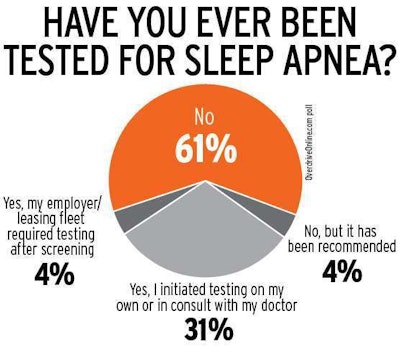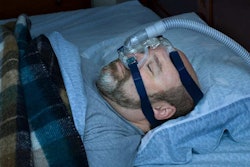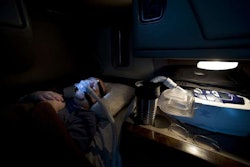 2014 polling on apnea treatment incidence
2014 polling on apnea treatment incidenceThe quote in the headline here is from Alaska-based driver and instructor Dan Tucker, who wrote in following yesterday’s coverage of the Federal Motor Carrier Safety Administration’s latest bulletin to DOT medical examiners and the training organizations for the National Registry of Certified Medical Examiners. Tucker, who describes himself as a long-term driver and CDL instructor — he drove “full-time for about five years (2005-10) and am now a driving instructor (classroom and road)” — also has been treated for sleep apnea for quite some time, with his medical certification renewed every two years, not the shorter one-year period often reported as common for drivers treated with sleep apnea.
Here’s his letter in full:
Since they started, I’ve been reading the articles on sleep apnea and think I’ve read most, but I wonder if I’ve missed something very important on the issue. I have been diagnosed with sleep apnea and have been using a CPAP for about two years. I didn’t suffer from “tiredness” before I was diagnosed – I was tested because my wife was tired of my snoring – and I don’t feel any more, or less, tired now. My machine, which I use faithfully every night (the chip says 7 hours constant/average forever) doesn’t seem to make much difference, but not using it doesn’t make a difference either. That’s not my point or issue.

Having been symptomatic, and diagnosed, and treated, and now complying with the “treatment plan” (CPAP use), what is my potential situation? Most of what I’ve seen written and commented on has been relative to “discovering” the problem; and promoting the testing; and initiating the treatment – if confirmed needed. Nothing seems to address the situation where it has been a symptom, has been tested, and is being treated successfully. It’s like a vacuum out there on “successful intervention” on the problem prior to visiting the medical examiner (ME). As it happens, it is my ME who I went to for the diagnosis and he’s (at least I believe and hope) “friendly” toward SA patients who are drivers. What has/does FMCSA say on that?
The deluge of information is overwhelming to the average person. And frustrating to many more who may be/are affected. I’ve got another year before my next exam (these standards weren’t in effect, nor was the ME list at the time of my last one) but sure hope to have this settle down before I get there. –Dan Tucker, Northern Industrial Training, Wasilla, Alaska
The short answer, for Dan’s particular case, is that the sky isn’t falling indeed. Nothing is likely to change for him, given FMCSA takes care to acknowledge in the recent bulletin the wide latitude examiners have to certify drivers with sleep apnea, given effective, proven treatment — a reality in his case. It’s unlikely his examiner would have him fall back to a shorter certification unless his apnea treatment showed signs of falling off in effectiveness.
In case there was any doubt, we asked FMCSA whether two-year certifications were possible for drivers with successfully treated apnea.
Yes, says spokesperson Marissa Padilla: The question of certification length is “really one for [the driver’s] medical professional.”
For those dealing with apnea today, how long is your medical certification?
Tucker notes his two-year certification may be “exceptional.” His “regular doc is [also] my ME, so he knows my entire history. Next, as noted, I got my last med cert” prior to institution of the National Registry and the required training (including on various apnea protocols) examiners have now gone through, reported on in this story.
“Before the sleep apnea issue blew up,” he says. “Whether he simply knew enough about me and my history and lack of a problem with sleep apnea (again, other than snoring I didn’t exhibit any real problems – no ‘constantly tired,’ no ‘daily drowsiness’) it never came up. And I got/have a two-year cert.”









